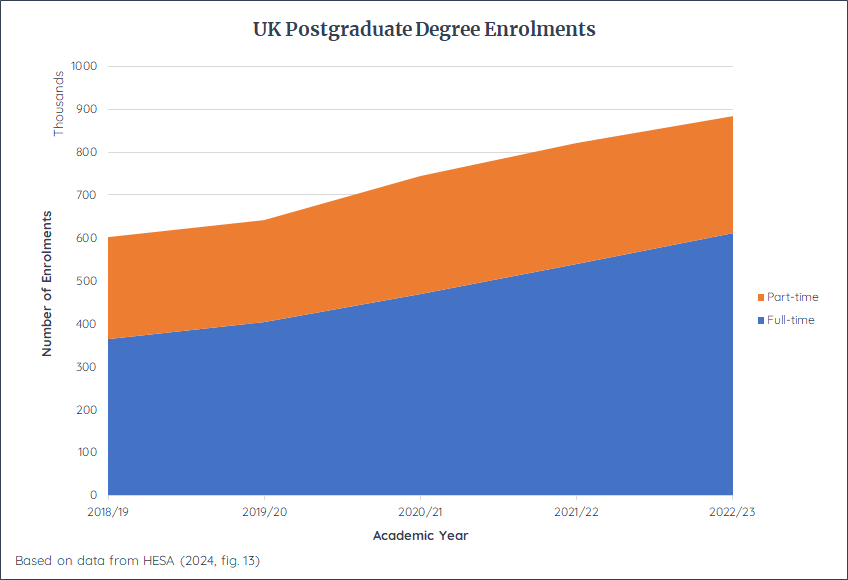
Master's degrees: What's in a title?
Despite the current rhetoric on a decline in undergraduate University applications, the number of postgraduate enrolments has been rising year-on-year largely fueled by a rise in international students. Latest data from HESA (2024) reflecting the 2022/23 academic year shows that there were 883,640 postgraduate enrolments, 30.7% of whom were studying part time.

Almost 85% of postgraduate students are studying a taught (rather than research) focused degree, the majority of which have a final exit award of a Master's. Despite a common understanding of the expectations of taught Master's degrees under the Bologna agreement, the award titles can vary widely between institutions and disciplines, leaving a complex picture of whether awards can be considered as equivalent based on their teaching, learning, and assessment strategies and student outcomes.
This article discusses the Master's degree taught award titles on offer from UK institutions, and the impact this may have on student choice and the perceptions of future employers.
Master of Arts (MA)
The MA is one of the oldest postgraduate qualifications in the world. Its roots can be traced back to medieval universities, where it signified a scholar’s mastery of what may be considered the 'liberal arts', a broad curriculum encompassing subjects like grammar, rhetoric, and philosophy. Over time, as academic disciplines evolved, the MA became associated with the humanities, arts, and social sciences.
In the UK, the MA is synonymous with intellectual exploration and theoretical analysis. MA programmes focus on critical thinking, interpretive skills, and a nuanced understanding of complex issues.
The disciplines where a student is most likely to be awarded an MA include:
History: An MA in History offers students the chance to explore periods, themes, and historical debates in depth.
Philosophy: Students engage with classic and contemporary philosophical texts, developing analytical and argumentative skills.
Literature: From Shakespearean drama to postcolonial literature, MA programmes in English explore the richness of the written word.
International Relations: This popular field examines global politics, diplomacy, and conflict resolution.
Learning, Teaching, and Assessment Strategy
MA programmes are typically structured around coursework, seminars, and independent research. For example, a student pursuing an MA in History might take modules on medieval Europe, British imperialism, and historical methodologies before completing a dissertation on a specialized topic.
Assessment methods often include essays, oral presentations, and a final research project. Unlike other Master's programmes, which may feature laboratory or practical components, MA programmes prioritise critical analysis and theoretical exploration. They may be considered more 'academic' in nature given their abstract study away from intended graduate career routes.
Master of Science (MSc)
The MSc degree emerged as universities began to recognize the growing importance of specialized scientific training. With the Industrial Revolution and the rise of technological innovation, the need for advanced study in fields like engineering, biology, and physics became apparent. Many post-92 universities originated from technical institutes, focusing on the skills required within industrial careers. Today, the MSc represents the pinnacle of postgraduate education in science and technology.
MSc degrees are frequently awarded in the following specialisms:
Data Science and Artificial Intelligence: With the rise of big data and artificial intelligence technologies, MSc programmes in data science and related topics are in high demand.
Physics: Advanced topics include quantum mechanics, astrophysics, and material science.
Environmental Science: As climate change becomes a pressing global issue, MSc programmes in this field are growing in relevance.
Finance: Combining mathematics and economics, MSc programmes in finance prepare students for careers in banking and investment.
Learning, Teaching, and Assessment Strategy
An MSc typically blends theoretical learning with practical application. For instance, an MSc in Computer Science might include practical coursework on algorithms, hands-on coding projects, and a research project with a digital artefact.
Assessment methods include exams, technical reports, and experimental research. The emphasis on problem-solving using real world contexts distinguishes the MSc from other postgraduate qualifications.
Specialized Master's awards
Over the past few decades, a number of subject-specific Master's award titles have emerged within UK universities. These aim to demonstrate the unique studies a student has undertaken within a particular industry, focusing on the relevant skills and knowledge required for a graduate to gain future employment.
The QAA (2020, p.13) Master's Degree Characteristics Statement helpfully provides an overview of the specialized postgraduate taught awards likely to be encountered at UK institutions, including professional practice degrees such as MBAs, MPharms, and MPAs. These are likely to be governed by the Subject Benchmark Statements and professional body accreditation schemes, prescribing additional requirements for student study to focus on the skills required in a specific future career.
Interdisciplinary degrees
Some fields, like Economics and Psychology, are offered with either MA or MSc award titles based on the institution. In general, an MA in Economics might focus on political economy and theory, an MSc would emphasize econometrics and quantitative methods. This demonstrates the difference between the practicality and focus of the degree. Most universities do not have strict criteria on whether an MA or an MSc should be offered for a particular subject; this is often resolved by the academics deciding based on their subject matter expertise and comparable offerings, verified through the validation process by an External Assessor.
The impact on student perceptions
The big question is, does the award title have an impact on student perceptions of a degree? For many students, the award title of their degree is more than a label; it represents the skills and expertise they have acquired. Certain titles may convey a sense of specificity or rigour, which students believe will help them stand out in competitive job markets. A more industry-recognized or niche title can signal to employers a degree’s relevance to a particular field, potentially improving employability. Conversely, a title perceived as generic or ambiguous may raise questions about the programme’s focus or depth, which could deter students from choosing such degrees. Furthermore within specialized fields such as Engineering, Law, and Medicine, there is an expectation to study specific awards to demonstrate skills and knowledge.
Interestingly, there is little research into the impact a Master's award title can have on student choice and perceptions, perhaps reflecting the longstanding practices adopted within institutions and disciplines. This lack of investigation may also stem from an assumption that students prioritise programme content, reputation, and career outcomes over the technicalities of degree award titles. However, as the higher education landscape becomes increasingly competitive and market-driven, understanding how award titles influence decision-making could provide valuable insights for institutions seeking to attract a diverse and global student body.
Research degrees
Whilst it is a standard expectation of a full Master's degree to incorporate a project or dissertation, this is alongside taught elements. Research Master's degrees usually carry alternate titles such as MRes, MPhil, or MLitt to denote the focus on independent study and the contributions students can make to the field. These serve as an intermediate qualification prior to doctoral level studies, though some universities do offer these awards as intermediate exit awards on PhD or DProf routes for those unable to complete their full level 8 research journey.
A note on Oxbridge MAs
Unlike the taught MA degrees offered by most universities, an MA from the Universities of Cambridge and Oxford is an honorary title, automatically granted to Bachelor of Arts (BA) graduates after a certain period, without requiring further coursework or examinations. This practice, unique to these two institutions, has its origins in the medieval university system and represents an enduring connection to historical academic customs.
The Oxbridge MA dates back to the medieval European university model, where degrees were awarded not only as certifications of learning but also as markers of academic standing and seniority. In these early universities, a BA signified a foundational mastery of the liberal arts, which included grammar, rhetoric, logic, and arithmetic. To advance within the academic hierarchy, scholars would often spend additional years teaching, debating, and engaging in scholarly activities before being granted the title of MA.
In the medieval tradition, the MA was less about completing new studies and more about recognising a scholar’s progression in intellectual maturity and their contributions to the academic community. At Oxford and Cambridge, this legacy evolved into a practice of granting MA status automatically to BA holders after a set number of years—originally symbolizing a scholar’s readiness to teach.
By the late Middle Ages, Oxford and Cambridge had formalized their approach to the MA degree, linking it closely to time spent as a graduate rather than to specific academic achievements. The MA degree at Cambridge became automatic for those who held a BA, maintained their academic association with the university, and remained in good standing. Over time, the emphasis on teaching eligibility diminished, and the MA became more of a symbolic title.
Today, the Oxbridge MA is conferred upon BA graduates without any additional study, usually after six or seven years following matriculation. It is widely regarded as a symbolic recognition of a graduate’s connection to their alma mater, rather than an academic qualification. This honorary degree allows alumni to use the MA title, although it carries no implications for further academic or professional standing.
Despite its honorary nature, the Oxbridge MA has practical benefits. Historically, it granted graduates membership in the university’s governing bodies, such as the Congregation at Oxford or the Senate at Cambridge. This ensured alumni could maintain a voice in university affairs.
The unique nature of the Oxbridge MA often leads to misunderstandings. Unlike the taught or research MAs offered at other universities, the Oxbridge MA does not reflect additional academic study. Instead, it is a testament to tradition, preserving a medieval system of academic progression and seniority. To prevent confusion with a studied MA, many style guides suggest that the title should always be presented as MA (Cantab) or MA (Oxon) to denote its honorary status.
Summary
In conclusion, the lack of research into how postgraduate degree award titles influence student perceptions represents a significant gap in understanding the factors driving student choices. While the content of a programme and its reputation undeniably remain paramount, the award title itself may play a more crucial role than commonly assumed, especially in a competitive global market. As higher education institutions increasingly tailor their offerings to meet the evolving demands of industry, degree titles could become more than just ceremonial labels—they may serve as key indicators of a graduate's expertise and suitability for specific career paths.
Given the rising number of postgraduate enrolments and the increasing diversification of award titles, understanding how students perceive these titles could provide valuable insights for both universities and employers. By researching how degree titles influence student decision-making, universities could refine their branding and marketing strategies to better align with student expectations and professional aspirations. Additionally, such research could help clarify the distinction between different types of Master's programmes, ensuring that students are making well-informed choices. As the landscape of postgraduate education continues to evolve, this knowledge could contribute to more transparent, effective, and relevant educational offerings that meet the needs of an increasingly global and competitive workforce.
References
HESA (2024). What do HE students study? HESA. https://www.hesa.ac.uk/data-and-analysis/students/what-study
QAA (2020). Master's Degree Characteristics Statement. QAA. https://www.qaa.ac.uk/docs/qaa/quality-code/master's-degree-characteristics-statement.pdf
